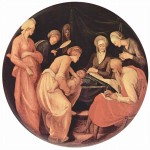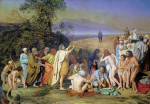Posted by petrus, on June 24th, 2020

The Birth of John the Baptist by Jacopo Pontormo (1494-1557). From The Yorck Project: 10.000 Meisterwerke der Malerei. DVD-ROM, 2002. ISBN 3936122202. Distributed by DIRECTMEDIA Publishing GmbH. Licensed under Public Domain via Wikimedia Commons
Almighty God, by whose providence thy servant John Baptist was wonderfully born, and sent to prepare the way . . . → Read More: The Nativity of Saint John the Baptist
Like this:Like Loading...
Posted by petrus, on June 22nd, 2020

“June”, kalendar page from Les Petites Heures d’Anne de Bretagne (The Little Hours of Queen Anne of Bretagne), by the Maître des Triomphes de Pétrarque. From Bibliothèque nationale de France, Paris (France).
Not much is known about Alban’s early life. His Legend begins when he met a Christian priest fleeing from persecutors . . . → Read More: On the Kalendar: Saint Alban, Proto-Martyr of Britain
Like this:Like Loading...
Posted by petrus, on June 22nd, 2020

The martyrdom of St Alban, from a 13th-century manuscript, now in the Trinity College Library, Dublin. From Wikipedia.
O God, in whose sight the death of thy saints is precious, and who gavest grace to thy blessed Martyr Saint Alban to glorify thee by his death: Grant that we, following his faith . . . → Read More: Saint Alban, Protomartyr of England
Like this:Like Loading...
Posted by Fr John, on June 21st, 2020

Here is a video of the Holy Eucharist “in tempore quarantinæ” for Trinity II, 21 June 2020. You can also watch the videocast of the Trinity Eucharist on YouTube, or on the parish’s Facebook pages: Saint Stephen’s Anglican Church, and Isaac’s FB page.
The complete collection of Eucharist videocasts is also . . . → Read More: Videocast: Trinity II, 2020
Like this:Like Loading...
Posted by petrus, on June 21st, 2020

O Lord, who never failest to help and govern those whom thou dost bring up in thy stedfast fear and love: Keep us, we beseech thee, under the protection of thy good providence, and make us to have a perpetual fear and love of thy holy Name; through Jesus Christ our Lord. Amen.
. . . → Read More: The Second Sunday after Trinity
Like this:Like Loading...
Posted by petrus, on June 20th, 2020

The Siege and Destruction of Jerusalem by the Romans Under the Command of Titus, A.D. 70, by David Roberts (1796-1849). From Wikipedia.
Hear our prayer, O Lord, and give ear unto our cry: We are strangers with thee, and sojourners, as all our fathers were: bondmen whom thou leddest out of oppression . . . → Read More: World Refugee Day
Like this:Like Loading...
Posted by petrus, on June 20th, 2020

O Lord Christ, who wast born in the bleak mid-winter, and yet was the Light of the world: shine thy love upon us even as the mid-summer sun shone upon the birth of thy cousin blessed John Baptist; and enkindle faith in our hearts, that we may join him in preparing thy way, even as . . . → Read More: Summer Solstice
Like this:Like Loading...
Posted by petrus, on June 19th, 2020

O Lord God of hosts, who with a mighty arm delivered Israel from bondage in Egypt: Let not our hearts be hardened like Pharaoh’s, but incline our hearts to mercy; that we might fight against slavery of body and mind, and oppression of the soul. Help us to welcome the liberated into the fulness of . . . → Read More: Juneteenth
Like this:Like Loading...
Posted by Fr Guy Hawtin, on June 18th, 2020

There is something especially apt about the selection of this passage from the Epistles—The First Epistle General of St. John 4:7-21 — for the start of the Trinity Season. It is a neatly encapsulated course of study that in modern academic lingo would probably be called “Fellowship with God 101.”
St. John’s object is to . . . → Read More: With righteousness, it’s a case of all or nothing
Like this:Like Loading...
Posted by petrus, on June 18th, 2020

“June”, kalendar page from Les Petites Heures d’Anne de Bretagne (The Little Hours of Queen Anne of Bretagne), by the Maître des Triomphes de Pétrarque. From Bibliothèque nationale de France, Paris (France).
People are generally familiar with the major gods of Ancient Rome, if only because they lend their names to planets: . . . → Read More: On the Kalendar: The Fourteen Holy Helpers
Like this:Like Loading...
|
Category-Specific RSS Feeds |











